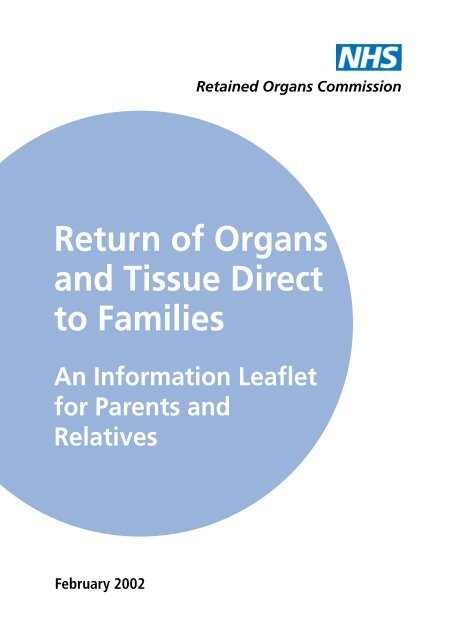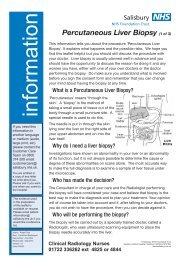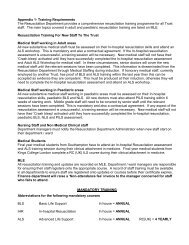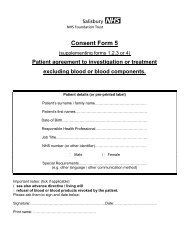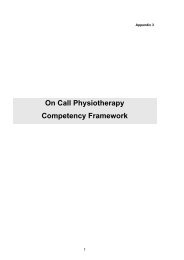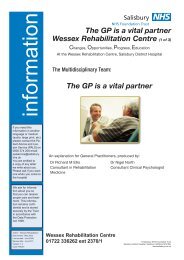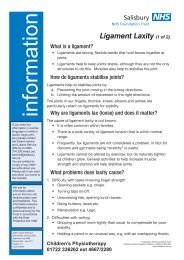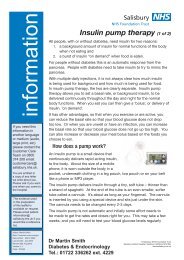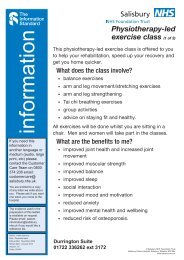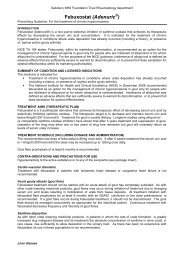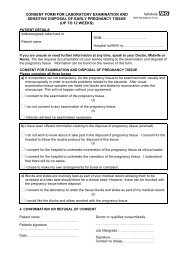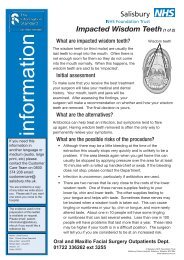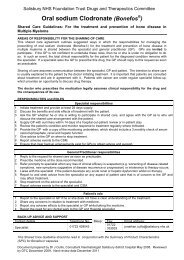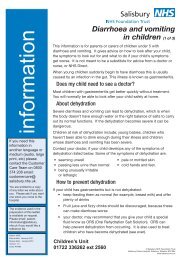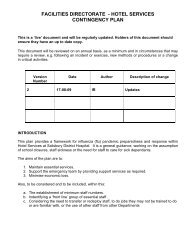Return of Organs and Tissue Direct to Families - ICID
Return of Organs and Tissue Direct to Families - ICID
Return of Organs and Tissue Direct to Families - ICID
You also want an ePaper? Increase the reach of your titles
YUMPU automatically turns print PDFs into web optimized ePapers that Google loves.
Retained <strong>Organs</strong> Commission<br />
<strong>Return</strong> <strong>of</strong> <strong>Organs</strong><br />
<strong>and</strong> <strong>Tissue</strong> <strong>Direct</strong><br />
<strong>to</strong> <strong>Families</strong><br />
An Information Leaflet<br />
for Parents <strong>and</strong><br />
Relatives<br />
February 2002
Foreword<br />
The Retained <strong>Organs</strong> Commission has produced this leaflet <strong>to</strong> help<br />
those families who have requested the return <strong>of</strong> organs <strong>and</strong> tissue <strong>of</strong><br />
a loved one. It deals with safety issues.<br />
The Commission is grateful <strong>to</strong> all those who contributed <strong>to</strong> the<br />
leaflet.<br />
Other leaflets in this series include:<br />
– <strong>Tissue</strong> blocks <strong>and</strong> slides; <strong>and</strong><br />
– How <strong>to</strong> start an inquiry regarding organ <strong>and</strong> tissue retention<br />
– Options for disposal <strong>of</strong> retained organs <strong>and</strong> tissue<br />
What is the Retained <strong>Organs</strong><br />
Commission?<br />
The Commission was set up by the Secretary <strong>of</strong> State in April 2001<br />
<strong>to</strong> help those families who have asked for organs <strong>and</strong> tissue from a<br />
family member <strong>to</strong> be returned <strong>to</strong> them. It is also planning the future<br />
management <strong>of</strong> collections.<br />
<strong>Return</strong> <strong>of</strong> <strong>Organs</strong> <strong>and</strong> <strong>Tissue</strong> <strong>Direct</strong> <strong>to</strong> <strong>Families</strong> 1
What are retained organs <strong>and</strong><br />
tissues?<br />
• Retained organs <strong>and</strong> tissues are whole organs <strong>and</strong>/or pieces <strong>of</strong><br />
tissue that have been removed at a post mortem examination<br />
carried out by a pathologist (a doc<strong>to</strong>r who specialises in<br />
diagnosis <strong>of</strong> disease by studying tissues).<br />
• They are normally kept for further examination <strong>to</strong> determine<br />
the cause <strong>of</strong> death or possibly later used for research, teaching,<br />
education <strong>and</strong> training.<br />
• They include organs, or tissue blocks <strong>and</strong> slides taken from<br />
organs. The main organs are the brain, heart, lungs, liver <strong>and</strong><br />
kidneys. There are also other smaller organs such as pituitary<br />
gl<strong>and</strong>s that produce hormones.<br />
• <strong>Tissue</strong> blocks are small pieces <strong>of</strong> organs. The tissue ‘blocks’ are<br />
specially prepared so that they become hard <strong>and</strong> very thin<br />
sections can be cut.<br />
• The thin sections are placed on glass slides <strong>and</strong> stained with<br />
special dyes so that the cells can be examined under a<br />
microscope. More than one slide may be cut from a block.<br />
<strong>Return</strong> <strong>of</strong> <strong>Organs</strong> <strong>and</strong> <strong>Tissue</strong> <strong>Direct</strong> <strong>to</strong> <strong>Families</strong> 3
I have chosen <strong>to</strong> have organs <strong>and</strong><br />
tissues returned directly <strong>to</strong> me,<br />
what will I need <strong>to</strong> do when I<br />
receive them?<br />
• You will need <strong>to</strong> decide how <strong>to</strong> dispose <strong>of</strong> them respectfully or<br />
where <strong>to</strong> s<strong>to</strong>re them. The choices are:<br />
– Burial in a place chosen by the family with arrangements<br />
made by the family or via a funeral direc<strong>to</strong>r<br />
– Cremation with arrangements made directly with the<br />
crema<strong>to</strong>ria or via a funeral direc<strong>to</strong>r<br />
– S<strong>to</strong>rage in a safe place in the home or other suitably<br />
secure environment<br />
If we choose a burial what do we<br />
need <strong>to</strong> be aware <strong>of</strong>?<br />
• If families wish <strong>to</strong> arrange a burial in a place other than a<br />
recognised churchyard or cemetery, they will need <strong>to</strong> contact<br />
local planning <strong>and</strong> environmental <strong>of</strong>ficers. Certain<br />
requirements need <strong>to</strong> be met <strong>and</strong> there may be local byelaws<br />
that need <strong>to</strong> be considered. Some <strong>of</strong> these are:<br />
– danger must not be caused <strong>to</strong> others<br />
– there must be no risk <strong>of</strong> contamination <strong>to</strong> water supplies<br />
– burial must take place at a minimum depth <strong>of</strong> at least 3<br />
feet or 90 cms<br />
– the burial must not interfere with any rights other people<br />
may have on the l<strong>and</strong><br />
– permission must be gained from the l<strong>and</strong>owner if the<br />
l<strong>and</strong> is not owned by the family<br />
4 Retained <strong>Organs</strong> Commission
• Before deciding <strong>to</strong> bury in a garden, the family should consider<br />
that they might not always be resident at that address.<br />
• Further advice can be obtained from local funeral direc<strong>to</strong>rs <strong>and</strong><br />
crema<strong>to</strong>ria <strong>and</strong> local councils. All will be listed in the local<br />
telephone direc<strong>to</strong>ry.<br />
How can I arrange a cremation?<br />
• You can contact a local funeral direc<strong>to</strong>r or approach the local<br />
crema<strong>to</strong>ria direct. Some crema<strong>to</strong>ria may not be willing <strong>to</strong><br />
accept tissue blocks or slides for cremation. You need <strong>to</strong> ask<br />
your hospital for advice on what is possible locally.<br />
What does the family need <strong>to</strong> be<br />
aware <strong>of</strong> if organs <strong>and</strong> tissue are <strong>to</strong><br />
be kept at home?<br />
• The hospital will provide you with information about any<br />
dangerous substances that have been used as part <strong>of</strong> the<br />
preservation process <strong>of</strong> the organs or tissues that are being<br />
returned <strong>to</strong> you.<br />
• Many organs are s<strong>to</strong>red in formalin, a substance hazardous <strong>to</strong><br />
health. When returning organs or tissues preserved in formalin<br />
hospitals usually remove the formalin solution <strong>and</strong> will make<br />
sure that they are in a strong sealed container. This will be<br />
accompanied with written information advising that the<br />
container should not be opened <strong>and</strong> explaining what <strong>to</strong> do in<br />
the event <strong>of</strong> an accidental spillage.<br />
<strong>Return</strong> <strong>of</strong> <strong>Organs</strong> <strong>and</strong> <strong>Tissue</strong> <strong>Direct</strong> <strong>to</strong> <strong>Families</strong> 5
• <strong>Tissue</strong> blocks made from paraffin wax are relatively safe <strong>to</strong><br />
return. If you are asking for direct return <strong>of</strong> tissue blocks<br />
made in other ways the hospital will consider each request<br />
individually <strong>to</strong> assess the risk involved.<br />
• Older slides may be more brittle <strong>and</strong> have sharp edges.<br />
Information setting out the risks involved will be provided for<br />
families.<br />
• <strong>Direct</strong> return <strong>of</strong> frozen material could involve risk <strong>of</strong> infection<br />
so the hospital would have <strong>to</strong> treat each case individually.<br />
The hospital may suggest ways <strong>of</strong> making sure that the tissue<br />
is made safe before it is returned. This may change the<br />
appearance <strong>of</strong> the tissue.<br />
• If you think you want <strong>to</strong> s<strong>to</strong>re returned organs <strong>and</strong>/or tissue at<br />
home or in another suitable place you first need <strong>to</strong> talk <strong>to</strong><br />
local planning <strong>and</strong> environmental health <strong>of</strong>ficers <strong>to</strong> make sure<br />
your plans are acceptable <strong>and</strong> satisfy health requirements.<br />
Is there any risk <strong>to</strong> health?<br />
• Hospitals have a legal obligation <strong>to</strong> protect the health <strong>and</strong><br />
safety both <strong>of</strong> their employees <strong>and</strong> members <strong>of</strong> the public.<br />
• To do this, hospitals need <strong>to</strong> make sure that by returning<br />
organs <strong>to</strong> families they are not putting members <strong>of</strong> the public<br />
at significant risk. They also have <strong>to</strong> provide information <strong>to</strong><br />
relatives about the limited risks that returning organs <strong>and</strong><br />
tissue may involve.<br />
• <strong>Families</strong> will be asked <strong>to</strong> confirm that they are aware <strong>of</strong> <strong>and</strong><br />
accept the associated risks.<br />
6 Retained <strong>Organs</strong> Commission
What should I do if I change my<br />
mind after having the organs <strong>and</strong>/or<br />
tissue returned?<br />
• If you find you cannot make the arrangements you had planned<br />
or you decide that you no longer want <strong>to</strong> keep the organs or<br />
tissue at home you can contact either the hospital or a local<br />
funeral direc<strong>to</strong>r. Both can advise you on what <strong>to</strong> do.<br />
What feelings might I experience?<br />
• No one can tell you exactly how you will feel. Some families<br />
will find that dealing with such sensitive issues reawakens<br />
feelings <strong>of</strong> grief <strong>and</strong> loss. There is no right way <strong>and</strong> some<br />
people experience a whole range <strong>of</strong> different emotions at<br />
different times. It may help <strong>to</strong> talk over the way you feel with<br />
someone you trust. Each person will grieve in different ways<br />
<strong>and</strong> experience different feelings at different times. You may<br />
find it hard <strong>to</strong> help each other. The hospital can <strong>of</strong>fer<br />
information about counselling or other services that may be <strong>of</strong><br />
help. You can also contact the organisations listed at the end <strong>of</strong><br />
this leaflet if you do not know where <strong>to</strong> turn for support.<br />
If you have children?<br />
• Sharing information <strong>of</strong> this nature with children can be difficult.<br />
Only you <strong>and</strong> your family can decide if it is the right thing for<br />
you <strong>to</strong> do <strong>and</strong> your decision will depend on the age <strong>of</strong> your<br />
children. You may wish <strong>to</strong> seek advice <strong>and</strong> support. The people<br />
that will be able <strong>to</strong> discuss this with you are your general<br />
practitioner, health visi<strong>to</strong>r, school nurse, teacher, the hospital or<br />
one <strong>of</strong> the organisations listed at the end <strong>of</strong> this leaflet.<br />
<strong>Return</strong> <strong>of</strong> <strong>Organs</strong> <strong>and</strong> <strong>Tissue</strong> <strong>Direct</strong> <strong>to</strong> <strong>Families</strong> 7
Where can I go for further<br />
information, help <strong>and</strong> support?<br />
Local Organisations<br />
Your local hospital will have an organ retention helpline. Hospital<br />
chaplains can <strong>of</strong>fer advice <strong>and</strong> support as can local funeral direc<strong>to</strong>rs<br />
<strong>and</strong> crema<strong>to</strong>ria.<br />
Support Groups<br />
Your local hospital will have contact details if a local group exists in<br />
your area.<br />
Pity II<br />
Relatives’ Support Group<br />
Set up by relatives <strong>and</strong> parents from Alder Hey, now <strong>of</strong>fering advice<br />
nationally.<br />
Stanley Community Enterprise Centre<br />
71 County Road<br />
Wal<strong>to</strong>n<br />
Liverpool<br />
L4 3QD<br />
Tel: 0151 285 0016<br />
Fax: 0151 285 0038<br />
Email: pity2@yahoo.co.uk<br />
Website: http://uk.geocities.com/pity2uk/HTLM/<br />
S<strong>to</strong>len Hearts Bereaved Parents Group<br />
Relatives’ Support Group<br />
Set up by relatives <strong>and</strong> parents in Birmingham, now <strong>of</strong>fering advice<br />
across the West Midl<strong>and</strong>s.<br />
Cllr Matthew Redmond MBE<br />
1 Chaucer Grove<br />
Acocks Green<br />
Birmingham<br />
B27 7RE<br />
Tel <strong>and</strong> Fax: 0121 706 9328<br />
8 Retained <strong>Organs</strong> Commission
National Committee relating <strong>to</strong> Organ Retention<br />
(NACOR)<br />
Relatives’ Support Group<br />
Set up by relatives <strong>and</strong> parents around the country in the wake <strong>of</strong><br />
events in Bris<strong>to</strong>l, now <strong>of</strong>fering support nationally.<br />
Helpline: 01271 377485<br />
Email: nacor@organretention.org<br />
Website: www.organretention.org<br />
SANDS<br />
Stillbirth <strong>and</strong> Neonatal Death Society<br />
Provides support for bereaved parents when their baby dies before<br />
during or soon after birth.<br />
28 Portl<strong>and</strong> Place<br />
London W1B 1LY<br />
Tel: 020 7436 7940<br />
Helpline: 020 7436 5881<br />
e mail: support@uk-s<strong>and</strong>s.org<br />
Website: www.uk-s<strong>and</strong>s.org<br />
Child Death Help Line<br />
Support <strong>of</strong>fered from bereaved parent volunteers <strong>to</strong> anyone affected<br />
by the death <strong>of</strong> a child.<br />
Freephone helpline: 0800 282986<br />
FSID<br />
Foundation for the Study <strong>of</strong> Infant Deaths.<br />
Research, support <strong>and</strong> advice on sudden infant death.<br />
Artillery House<br />
11-19 Artillery Row<br />
London<br />
SW1 1RT<br />
020 7222 8001<br />
24 hour helpline: 020 7233 2090<br />
Fax: 020 7222 8002<br />
<strong>Return</strong> <strong>of</strong> <strong>Organs</strong> <strong>and</strong> <strong>Tissue</strong> <strong>Direct</strong> <strong>to</strong> <strong>Families</strong> 9
Cruse<br />
Offer support <strong>to</strong> all bereaved people.<br />
National helpline: 0870 167 1677<br />
Website: www.crusebereavementcare.org.uk<br />
The Samaritans<br />
Provides confidential emotional support for anyone in crisis.<br />
National Helpline 0845 790 90 90<br />
INQUEST<br />
Provides advice <strong>and</strong> information for anyone facing an inquest <strong>and</strong><br />
has unique experience <strong>and</strong> knowledge <strong>of</strong> the inquest system.<br />
Ground Floor<br />
Alex<strong>and</strong>ra National House<br />
330 Seven Sisters Road<br />
London N4 2PJ<br />
Tel: 020 8802 7430<br />
Fax: 020 8802 7450<br />
E-mail: inquest @inquest.org.uk<br />
Web: www.inquest.org.uk<br />
Child Bereavement Trust<br />
Information <strong>and</strong> support for pr<strong>of</strong>essionals <strong>and</strong> parents<br />
Helpline: 0845 351100<br />
10 Retained <strong>Organs</strong> Commission
Useful Information<br />
Retained <strong>Organs</strong> Commission<br />
Retained <strong>Organs</strong> Commission Helpline: Freephone 0800 092 0203<br />
E-mail: retained-organs-commission@doh.gsi.gov.uk<br />
Web: www.nhs.uk/retainedorgans/index.htm<br />
Natural Death Centre<br />
For inexpensive or environmentally friendly alternatives <strong>to</strong><br />
conventional burial <strong>and</strong> cremation.<br />
20 Heber Road<br />
London<br />
NW2 6AA<br />
Tel: 0208 208 2853<br />
Fax:0208 452 6434<br />
E-mail: rhino@dial.pipex.com<br />
Web: www.naturaldeath.org.uk<br />
Book: The New Natural Death H<strong>and</strong>book (£12.99 incl. p&p)<br />
The Retained <strong>Organs</strong> Commission <strong>of</strong>fers information on the above<br />
organisations as a source <strong>of</strong> help <strong>and</strong> support for families <strong>and</strong> relatives.<br />
The Commission does not formally endorse the organisations in any way.<br />
The guidance in this leaflet is intended <strong>to</strong> apply on a general basis only. It<br />
does not attempt <strong>to</strong> (nor can it) anticipate all possible individual<br />
circumstances. If you need further information, you may wish <strong>to</strong> contact<br />
one <strong>of</strong> the organisations referred <strong>to</strong> above. However, if you are currently<br />
involved in litigation arising in connection with the retention or return <strong>of</strong><br />
organs <strong>and</strong> tissue <strong>and</strong> the treatment <strong>of</strong> your child or relative, or if you<br />
consider that there is a possibility <strong>of</strong> such litigation in the future, you<br />
should consider taking specific legal advice in relation <strong>to</strong> the application <strong>of</strong><br />
the guidance in this leaflet <strong>to</strong> your own individual circumstances.<br />
<strong>Return</strong> <strong>of</strong> <strong>Organs</strong> <strong>and</strong> <strong>Tissue</strong> <strong>Direct</strong> <strong>to</strong> <strong>Families</strong> 11
Further free copies are available from:<br />
The Retained <strong>Organs</strong> Commission<br />
PO Box 32794<br />
London<br />
SE1 6WA<br />
Tel: 0800 092 0203<br />
fax: 0207 972 2017<br />
E-mail: retained-organs-commission@doh.gsi.gov.uk<br />
It is also available on the website: www.nhs.uk/retainedorgans/index.htm<br />
© Crown Copyright<br />
Produced by Department <strong>of</strong> Health<br />
27032 1P 30k Mar 02 (ABB)<br />
CHLORINE FREE PAPER


